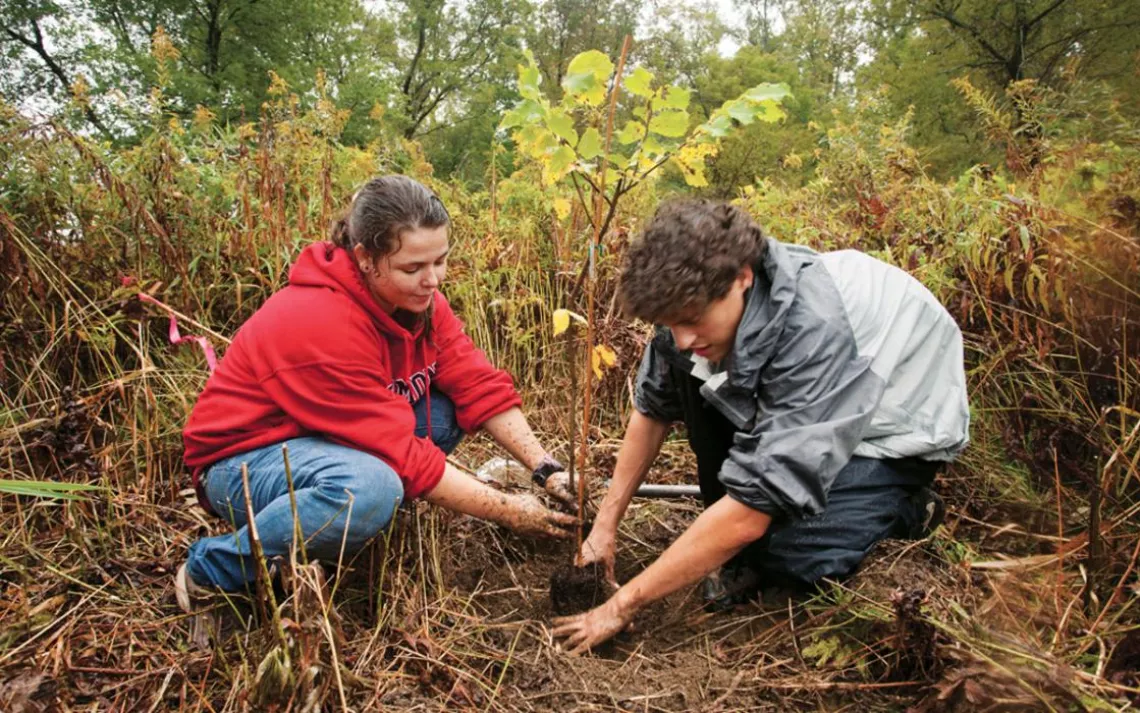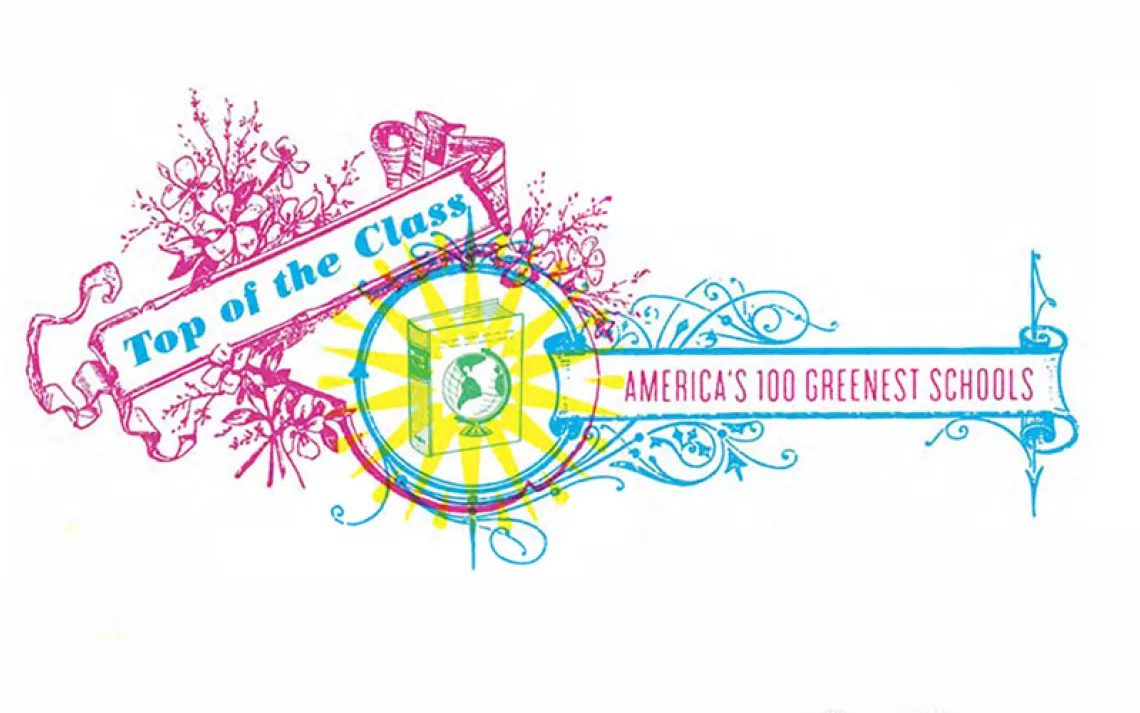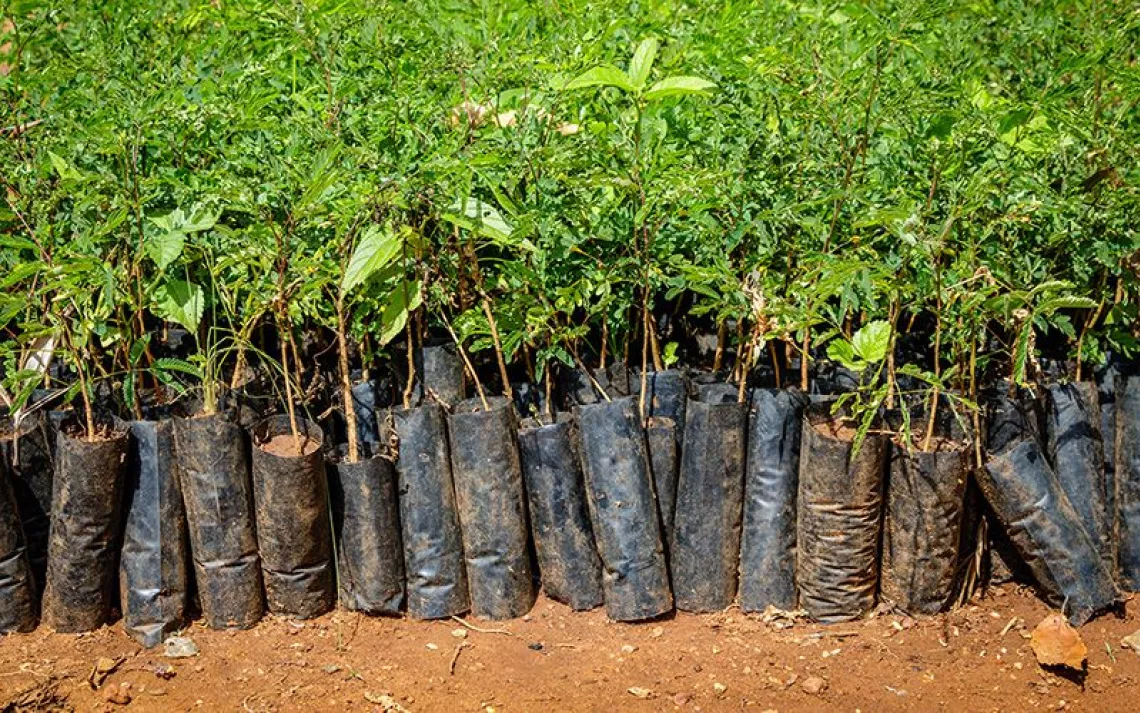The Top 20 Coolest Schools 2018
Here's why the greenest colleges of 2018 rank at the top of their class

Green Mountain College students working on riverine floodplain forest restoration plant an American elm along Vermont’s Poultney River. | Courtesy of Green Mountain College
The Top 20 | The Complete Ranking: All 269 Schools | Methodology | FAQ | More Cool Schools
In the 12 years since Sierra began highlighting the best environmental practices of colleges and universities, the competition to be the ecofriendliest in all of academia has gotten fierce. This year, we received a record 269 responses from qualified institutions, which now include Canadian schools and community colleges. Our annual Cool Schools Rankings assess colleges' performance in everything from what they teach to how they obtain their electricity to their sources of cafeteria food and how they manage their water. Please join Sierra in congratulating the very green—and diverse—schools that are mastering the art and science of campus sustainability.
20: Cornell University
Score 74.47 | Ithaca, New York

Anabel’s Grocery is a student-run initiative designed to combat food insecurity on the Cornell campus, providing low-cost groceries to students. | Courtesy of Cornell University
Last year, Cornell launched Anabel's Grocery, a student-run food supply providing low-cost access to local, organic, and culturally inclusive foods. It also broke ground on the Sustainable Landscapes Trail, designed to highlight 14 campus spots that showcase Cornell's commitment to natural lands management (think rainwater capture stations, pollinator plants, and permaculture plots). Since 2008, this Ivy has reduced campus emissions by 36 percent and cooling energy by 86 percent, largely through proprietary innovations such as Lake Source Cooling—running a pump from one of upstate New York's nearby deep lakes to pipe cold water through campus. The Touchdowns are now experimenting with Earth Source Heat, a new system that involves drilling into the earth's upper crust and piping thermal heat through the often-chilly campus.
19: Loyola Marymount University
Score 74.74 | Los Angeles, California

Loyola's Office of Sustainability and students designed and built a solar golf cart. | Courtesy of Loyola Marymount University
Not only has LMU operated a self-funded recycling plant since 1990, but it also won Los Angeles's inaugural "RecycLA" platinum award this year, thus becoming a model for the rest of the city. LMU was also the first university to sign onto the Lonely Whale Foundation's pledge to purge plastic straws. "The Cycling Lion," a shipping container turned bicycle hub, offers a recycled bike shop and bike-share program. The Lions are on track to divert all food waste by the end of 2019, thanks to a campus-wide food waste disposal and awareness program and a robust composting program. Students also work within a nearby underserved neighborhood to boost awareness of composting, provide food waste options, and develop a community garden.
18: University of Dayton
Score 74.93 | Dayton, Ohio

UD's first green roof on the Kennedy Union patio, the culmination of years of work by students, faculty, and staff in many areas across campus. | Photo by Bruce Damonte
The first Catholic university in the nation to divest from fossil fuel companies also has an Energy Team composed of students who work with campus facilities departments to perform energy and lighting audits. The team proposes and implements conservation projects, the funding for which often comes from UD's green revolving fund, which pays for itself through energy and other environmental savings. UD boasts low-flow showerheads and 1.3-and-counting megawatts of solar. Students living in university-owned campus houses receive feedback on their energy usage (their "energy GPAs"). Dayton Flyers can study environmental biology, pursue master's degrees in renewable and clean energy, and work the earth at nearby Lincoln Hill Garden, an urban farm and community green space the school established with community partners.
17: Lewis & Clark College
Score 75.05 | Portland, Oregon

Lewis & Clark students participate in numerous modes of active transit, including biking, walking, taking the bus, and carpooling. | Courtesy of Lewis & Clark College
In the past year, Lewis & Clark has committed to selling off its fossil fuel investments, passed a policy to phase out all single-use plastics, and launched a Hot Topics series through which speakers come to campus to discuss issues such as environmental justice, biodiversity, and socially responsible investing. The school's Farm to Fork initiative mandates that campus dining spend 20 percent of its funding on food sourced from small, local farms and producers, and the campus, which runs into two watersheds, recently re-upped its Salmon Safe designation. Lewis & Clark students can study ecopsychology and natural resources law and take classes in the political economy of food. When they're not in class, many are involved with extracurricular pursuits including the beekeeping club, a bike co-op, and a garden collective.
16; University of Oregon
Score 75.42 | Eugene, Oregon

Allan Price Science Commons is one of the school's newest LEED Gold-certified buildings. | Courtesy of University of Oregon
A year and a half ago, student activists pressured the University of Oregon to renew its climate action plan. As a result, the school has already reinsulated 16 miles' worth of campus steam and condensate pipes, thus reducing at least 54 metric tons of annual greenhouse gas emissions. The Ducks' new-and-improved climate plan is also funding environmental economists' research into internal carbon taxes that U of O, and perhaps eventually other institutions, could implement. The university is currently installing a shipping container outfitted with LED lights wherein students can experiment with the latest in indoor agriculture and recently received a grant to integrate sustainability courses with the work of area municipalities and nonprofits—meaning students will be working to solve real-world energy and transportation issues. Through "rEV Up Eugene," the University of Oregon hosts free community workshops about electric vehicles.
15: Oregon State University
Score 75.82 | Corvallis, Oregon

OSU staff move materials during the Move Out Donation Drive, which in 2018 collected over 32,300 pounds of reusable material. | Courtesy of Oregon State University
Oregon State's trustees are in the process of developing a plan to divest a portion of its funding from fossil fuels and to diversify its portfolio of carbon-free funds. Meanwhile, students are enrolling in programs such as "humanitarian engineering," "sustainable agroforestry," and "sustainable cemeteries management." The consumption-wary Beavers have a textbook loan program in place as well as an "OSUsed" store and cap-and-gown return program. OSU dorms employ Eco-Reps, who educate residents on green lifestyle practices, and the school works with local food distributors, caterers, and restaurants to divert food waste to its campus food pantry.
14: Chatham University
Score: 76.09 | Pittsburgh, Pennsylvania

Eden Hall campus | Courtesy of Chatham University
No matter their major, every undergrad at Chatham must take sustainability courses, and most undergrads, grad students, and MBAs pursue degrees in sustainability or food studies. This year, Chatham is launching a new program to help prepare nursing students and other future health professionals for climate-change-induced public health threats. Thanks to its solar thermal greenhouse and "work-and-pick" garden, Chatham produces enough food to help supply its dining hall. Many students recently banded together to present a divestment proposal. Good news: Chatham's Board of Trustees is likely to approve it by October.
13: Santa Clara University
Score 76.13 | Santa Clara, California

SCU's Center for Sustainability hosts a "waste characterization" almost every quarter for staff, faculty, and students. | Courtesy of Santa Clara University
Nine out of 10 students attending the "Jesuit University in Silicon Valley" engage in community-based learning for course credit. A food justice outreach program, for instance, works within marginalized neighborhoods to bolster community gardens and helps elementary students to develop urban gardens. Thanks to a deal wherein faculty can receive stipends to integrate eco- and/or social justice-oriented curricula into their syllabi, 93 percent of Santa Clara departments offer sustainability courses. The Broncos are currently working to reduce their food waste by 20 percent by 2025 and to increase the use of the school garden's on-site composting center.
12: American University
Score 76.53 | Washington, D.C.

American University emphasizes the importance of alternate transportation during its annual Transportation Fair. Here, a student sustainability educator demonstrates how to put a bike on the front of a bus. | Courtesy of American University
American University achieved carbon neutrality last spring (two years ahead of schedule) with help from its seven on-campus solar arrays, several off-site arrays, and a unique portfolio of carbon credit purchases. At home in D.C., the Eagles plant trees to offset commuting emissions; at the school's study-abroad hub in Kenya, AU provides communities with efficient cookstoves to help offset students' air travel. Through AU's film program, many students create and showcase environmental documentaries. The school recently acquired a Virginia farm in hopes of offering students opportunities to study sustainable agriculture while developing farm-to-table cafeteria menus.
11: Sterling College
Score 76.86 | Craftsbury Common, Vermont

Sterling College students prep seed potatoes for planting while a class prepares a hugelkulture bed, a permaculture technique for making a raised bed (background). | Courtesy of Sterling College
At Sterling, where most students labor on farms and forestlands in exchange for tuition (and produce upwards of 30 percent of food served on campus), the focus is on how best to steward working landscapes. So it's fitting that students are putting Wendell Berry's writing to work through a new partnership with the Berry Center, located in the author-activist's native Henry County, Kentucky. Each semester, students have opportunities to go south and help cultivate a different landscape. Meanwhile, Sterling faculty is developing curricula for Kentuckians seeking to implement holistic and sustainable farm plans. Back in Vermont, students are learning the craft of woodworking using ecologically harvested timber at Sterling's new Rural Arts Center.
10: Middlebury College
Score 76.99 | Middlebury, Vermont

The Knoll, Middlebury College's garden, is home to vegetable and flower production, an outdoor oven, research, mindfulness training, and more. | Courtesy of Middlebury College
After reaching its carbon neutrality goal in December 2016, the overachievers of Middlebury were hungry for more. In January, the Panthers broke ground on a Sustainability Solutions Lab designed to source students' most innovative ideas—for ways the school could source 100 percent renewable power by 2028, for instance—and to teach them how to seek support, calculate risks, and navigate the administrative challenges of effecting change. This year, Middlebury conducted an ecological assessment of its 6,000+ acres of forestland to account for flora and fauna as well as the lands' cultural/anthropological value and recreational and aesthetic bona fides.
9: California State University, Chico
Score 78.00 | Chico, California

Angelica Rodriguez collects water samples for her Chico STEM Connections Collaborative summer research project. | Photo by Jason Halley
One of 12 founding signatories of 2007's American Colleges & Universities Climate Commitment, Chico State has since reduced its emissions by more than a third, constructed seven (and counting) LEED-certified buildings, and initiated an Eco Resident Certification for dorm dwellers who live lightly. Through 14 courses, Chico State's Resilient Cities Initiative has involved students in assessing the community's transportation infrastructure, urban tree cover, and luminescence, with the goal of making recommendations—such as solar roadways and expanded bike lanes—to government planners. For the Regenerative Agriculture Initiative, students and faculty partner with farmers in California's Sacramento Valley to research tilling practices, methane capture, and other means of sequestering carbon.
8: Seattle University
Score 78.41 | Seattle, Washington

Seattle University students and staff sort one day's worth of trash at the annual Garbology event. | Courtesy of Seattle University
Seattle U students put the fossil fuel divestment challenge to their administration six years ago and never piped down. As a result, the trustees are on track to approve divestment this fall. The very edible campus has been pesticide-free since 1979, and its 50-acre urban wildlife sanctuary is designed to attract birds with lush, native flora. Every other year, the Redhawks host an environmental justice summit, which this year will ignite student and faculty activism around restoring the nearby Duwamish River, Washington's most industrialized waterway. Seattle U is working to become carbon negative by 2020.
7: University of Massachusetts, Amherst
Score 79.07 | Amherst, Massachusetts

Nearly 45 tons of produce are grown annually on the student farm. | Courtesy of University of Massachusetts, Amherst
The home of New England's largest campus solar installation is synthesizing its 400-plus environment-related courses into a new School of Earth and Sustainability, which will make eco-oriented resources, opportunities, and faculty more accessible while promoting collaboration across departments. All students and faculty can apply for support from the Sustainability Innovation and Engagement Fund. The fund helps underwrite an annual New2You back-to-school sale of recycled dorm wares, a student-run sustainable vineyard, and an organic CSA program.
6: Dickinson College
Score 80.67 | Carlisle, Pennsylvania

Students involved in the Hive build and improve native bee habitats on and off campus. | Courtesy of Dickinson College
This past year, Dickinson not only broke ground on a new LEED Platinum–certified dorm but also launched a Residential Life Sustainability Program. Students attend sessions on sustainable cooking and shopping, water and energy conservation, and transportation. Dickinson also launched a beekeeping cooperative, modeled after its seven-year-old campus bike co-op, that has students tending pollinator gardens and crafting balms, soaps, and candles that they gift to the larger community. Thanks to a three-megawatt solar array that went online in August, Dickinson is on track to meet its 2020 carbon-neutrality goal.
5: Arizona State University
Score 81.04 | Tempe, Arizona

ASU and local utility volunteers plant trees in Phoenix for carbon offsets. | Courtesy of Arizona State University
Even with a record 100,000-plus students enrolling this fall, ASU keeps getting cooler by the year. There are incentives for athletic teams to earn Sustainable Sports Certifications and for research units to become official Green Labs. ASU just approved a carbon-neutral policy for new buildings as well as a novel Carbon Project fund that will be supported by contributions to offset faculty and student air travel. The Carbon Project will pay for programs such as planting trees in the low-income heat islands of sprawling Phoenix, planting an on-campus "carbon sink" forest, and electrifying the university's car fleet.
4: Colorado State University
Score 81.22 | Fort Collins, Colorado

CSU was designated a platinum-level Bicycle Friendly University by the League of American Bicyclists. | Courtesy of Colorado State University
Colorado State offers more than 800 sustainability-related courses. This year, the Rams got a new football stadium, and students rallied to assemble a zero-waste team of volunteers tasked with schooling sports fans on what's recyclable, compostable, and landfill bound. Thanks to students' activism, the university also adopted a fair-trade-preferable purchasing policy: Unlike most state universities, which are required to take the lowest bid, CSU now will weigh environmental and labor factors in all buying decisions.
3: University of Connecticut
Score 81.76 | Storrs, Connecticut

The Husky mascot decked out for women’s basketball Green Game Day. | Courtesy of University of Connecticut
The only university to attain Green Restaurant Certification for all eight of its dining halls, UConn offers food that is 47 percent organic or locally sourced, and all food waste gets hauled to an anaerobic digester. It's part of the Huskies' plan to become carbon neutral by 2050 and to reduce greenhouse gas emissions by 20 percent, from a 2007 baseline, by 2020. But UConn's greenness isn't merely top-down. The largest extracurricular club is the Eco Huskies: students who sort trash at games, perform green audits on campus, and operate a recycling patrol and a clothing swap.
2: University of New Hampshire
Score 84.30 | Durham, New Hampshire

UNH students remove invasive buckthorn on campus. | Courtesy of University of New Hampshire
The home of the nation's oldest endowed sustainability office embeds ecology into nearly all of its academic offerings. UNH has the very first eco-gastronomy major as well as a dual major that allows students to study sustainability through the context of, say, economics or Spanish. The Wildcats, who made an impressive 18-spot leap in our rankings this year, pipe methane from a landfill to campus, thus supplying 85 percent of campus energy needs. Considering UNH's on-campus Amtrak stop, organic dairy farm, and food-waste-reduction system through which water is extracted from dining hall leftovers to be recycled before the food waste gets composted, eco-stewardship is clearly integral to the school's ethos.
2: University of California, Irvine
Score: 86.95 | Irvine, California

Katherine Mackey (top), Clare Boothe Luce Assistant Professor of Earth System Science, consults with doctoral researcher Raisha Lovindeer. | Photo by Steve Zylius / UCI
In its ninth year among Sierra's 10 coolest colleges, UCI leapt seven spots—thanks in part to net-zero-emission housing construction and a pioneering power-to-gas hydrogen-pipeline injection project in which solar power generated on campus is converted into hydrogen and inserted into the Anteaters' gas supply, creating a partially decarbonizing effect. Last year, undergrads in the College of Sustainability compiled a climate-friendly cookbook, and other students developed a program to encourage broader bicycle use.
1: Green Mountain College
Score: 86.95 | Poultney, Vermont

Green Mountain College students working on riverine floodplain forest restoration plant an American elm along Vermont’s Poultney River. | Courtesy of Green Mountain College
The second college in the nation to reach carbon neutrality is aggressively working toward a new goal of powering its campus solely via renewable energy by 2020—with help from a student-initiated biomass facility and the purchase of carbon offsets from a landfill-gas-capture project. GMC has also tweaked its eco-centric core curriculum to better account for economic and environmental justice issues. New practicums have students examining the nexus of hunger, food, and homelessness in New York City and decorating the campus with a series of "What Is Social Sustainability?" posters.
 The Magazine of The Sierra Club
The Magazine of The Sierra Club



